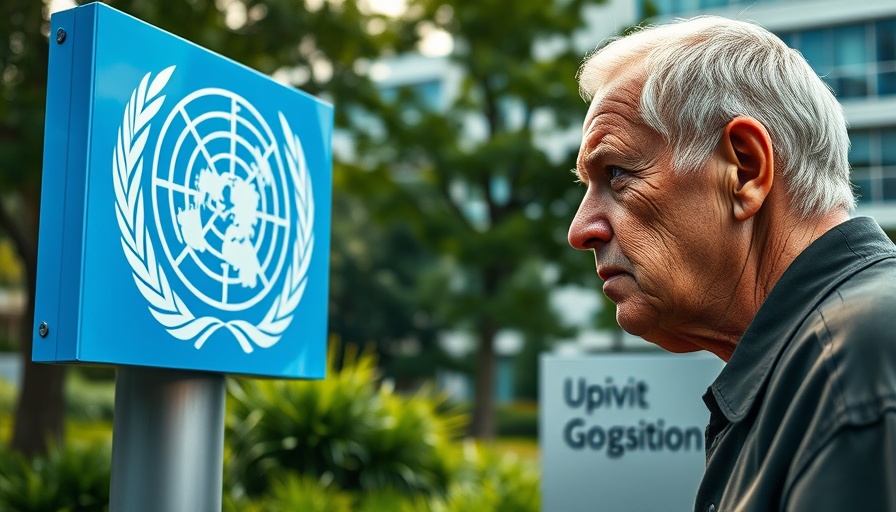
Ukraine's Black Earth: A Treasure Under Threat
As war ravages the landscapes of Ukraine, another crisis unfolds silently beneath the surface. Known for its "chernozem," or black earth, Ukraine has long been celebrated for having some of the most fertile soil in the world. With the backdrop of a brutal conflict, foreign agribusiness giants are strategically positioning themselves to seize control of this invaluable resource. Amidst the turmoil, local farmers are grappling with displacement and uncertainty, while corporate titans such as BlackRock and Vanguard exploit the situation to expand their agricultural reach.
The Silent Land Grab: Corporate Interests Take Over
The implications of the war extend beyond immediate violence; they lead to a new type of land grab, initiated by large investment firms and agribusiness corporations. Since the lifting of Ukraine's land-sale moratorium in 2020—pushed through under pressure from the International Monetary Fund (IMF)—nearly 28% of the country's arable land is now held by foreign entities. This situation raises serious concerns about food security both locally and globally.
Recent reports from independent organizations, like the Oakland Institute, underline the alarming trend: agribusinesses are buying up farmlands through complex financial maneuvers often concealed by shell corporations in tax havens. As Ukrainian farmers struggle to maintain their livelihoods, foreign investors turn agriculture into a mere commodity traded on Wall Street, with little regard for the humanitarian impact.
Costs of the Agricultural Deregulation
While Ukraine's fertile lands could provide ample food for both locals and global markets, deregulation has turned the farmland into a playground for corporations. Unlike their counterparts in the European Union, who must comply with stringent environmental standards, Ukraine allows the use of banned fertilizers and genetically modified organisms (GMOs). This divergence invites corporations like Monsanto to experiment with practices that are otherwise restricted in more regulated markets.
Labor costs in Ukraine are significantly lower than in countries like Hungary, making it economically attractive for agribusinesses to operate. The absence of animal welfare laws and regulatory oversight enhances this appeal. As a result, the soil, once a rich source of national pride, is threatened with exploitation that prioritizes profit over sustainability.
Global Implications: A Threat to Food Security
The ramifications of this land grab extend well beyond Ukraine's borders. Should Ukraine become a member of the EU, there is a risk that deregulated crops from foreign corporations could flood European markets, adversely affecting local farmers and food systems. This potential upheaval poses a critical concern for food sovereignty across the continent.
As András Tibor Cseh, an agricultural expert warns, "They don’t care about feeding people—they care about controlling the food supply." This sentiment underscores a growing fear that Ukraine may become a "sacrifice zone" for the ambitions of global agribusiness, disrupting traditional agricultural practices and threatening the livelihoods of countless farmers.
Community Resistance: The Fight for Local Agriculture
Despite these daunting challenges, there are voices of resistance rising among local communities. Farmers and activists are advocating for reforms that prioritize their rights and the preservation of their agricultural heritage. By uniting under the banner of food sovereignty, they aim to reclaim their lands and resist the onslaught of corporate interests.
Innovative grassroots movements, coupled with strategic alliances and local organizations, are working to educate the public about the implications of corporate takeovers in agriculture. These efforts emphasize the importance of nurturing local farming systems and provide platforms for community support.
What's at Stake: The Need for Awareness and Action
Understanding these intricacies surrounding Ukraine’s agricultural landscape is essential, as they resonate globally in a time of crisis. The actions taken now will have lasting effects on food security, not only in Ukraine but around the world. Supporting local farmers and advocating for sustainable practices can foster resilience against corporate dominance.
Now is the time for individuals interested in sustaining their communities and supporting ethical agricultural practices to become informed and engaged. By actively participating in discussions and advocating for policies that promote local agriculture, every individual contributes to a larger narrative of resistance against corporate monopolization.
 Add Row
Add Row  Add
Add 




Write A Comment